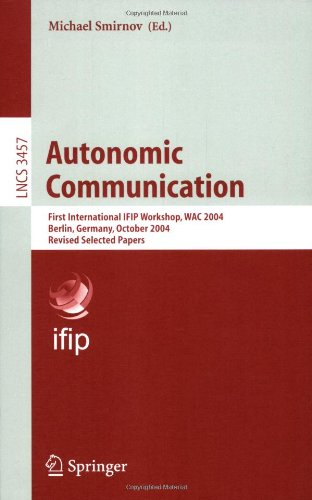

Most ebook files are in PDF format, so you can easily read them using various software such as Foxit Reader or directly on the Google Chrome browser.
Some ebook files are released by publishers in other formats such as .awz, .mobi, .epub, .fb2, etc. You may need to install specific software to read these formats on mobile/PC, such as Calibre.
Please read the tutorial at this link: https://ebookbell.com/faq
We offer FREE conversion to the popular formats you request; however, this may take some time. Therefore, right after payment, please email us, and we will try to provide the service as quickly as possible.
For some exceptional file formats or broken links (if any), please refrain from opening any disputes. Instead, email us first, and we will try to assist within a maximum of 6 hours.
EbookBell Team

4.4
102 reviewsThe ?rst IFIP Workshop on Autonomic Communication (WAC 2004) was held 18–19 October 2004 in Berlin, Germany. The workshop was organized by Fra- hofer FOKUS with the help of partners of the EU-funded Autonomic Com- nication Coordination Action — IST-6475 (ACCA), and under technical sp- sorship of IFIP WG6. 6 — Management of Networks and Distributed Systems. The purpose of this workshop was to discuss Autonomic Communication—a new communication paradigm to assist the design of the next-generation n- works. WAC 2004 was explicitly focused on the principles that help to achieve purposeful behavior on top of self-organization (self-management, self-healing, self-awareness, etc. ). The workshop intended to derive these common principles from submissions that study network element’s autonomic behavior exposed by innovative (cross-layer optimized, context-aware, and securely programmable) protocol stack (or its middleware emulations) in its interaction with numerous, often dynamic network groups and communities. The goals were to understand how autonomic behaviors are learned, in?uenced or changed, and how, in turn, these a?ect other elements, groups and the network. The highly interactive and exploratory nature of WAC 2004 de?ned its format — six main sessions grouped in three blocks, each block followed by a panel with all speakers of the previous block as panellists and session chairs as panel moderators. The?rstpanelaimedtohighlightthemainprinciplesguidingresearchinal- rithms,protocolsandmiddleware;thesecondpanelinvestigatedgrandchallenges of network and service composition; the third panel had to answer the question “HowDoestheAutonomicNetworkInteractwiththeKnowledgePlane?”. Panel reports were compiled by panel moderators and conclude this volume.